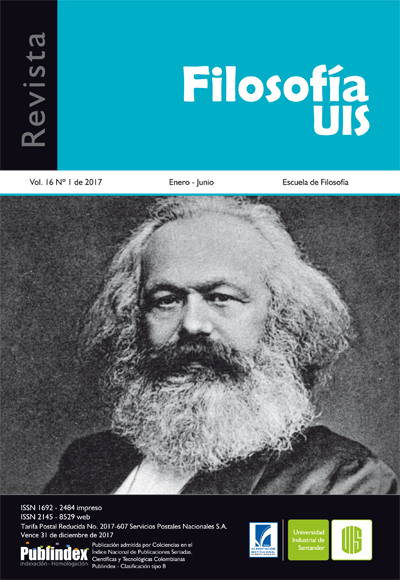The detachment of time as sedimentation of the consciousness of old age
Published 2017-09-11
Keywords
- old age,
- aging,
- time consciousness,
- body,
- SABE Colombia
How to Cite
Copyright (c) 2017 Revista Filosofía UIS

This work is licensed under a Creative Commons Attribution 4.0 International License.
Abstract
In this text we approach the process of aging from the philosophical view-point of the awareness of time. We consider this awareness of paramount importance not only in the course of the research project SABE Colombia (Survey of Health, Well-being and Aging, according to its initials in Spanish), but also because of the very structure of life. Moreover, old age in itself, as a time-related phenomenon, consists of the accumulation of time in a single body: therefore, the notion of time must be implicit in the study of aging. This article aims at revealing the sense of the time consciousness of old age or (in other words) at viewing old age in the light of time consciousness, insofar as time lets human existence come off gradually until its exhaustion reveals life as a time trace, as a time mark in the body. To achieve this goal, we propose three nodal points of reflection: first, between the latency and the presence of old age; second, between old age and the secrecy of future, and finally, the face of old age: the detachment of the body through the time consciousness of the present.
Downloads
References
Arroyo, M.; Ribeiro, F. y Mancinas, S. (2011). La vejez avanzada y sus cuidados. Historias, subjetividad y significados sociales. Monterrey: Universidad Autónoma de Nuevo León.
Bergson, H. (1948). Obras escogidas. Madrid: Aguilar.
Carrizo, R.; Fitzsimons, M.; Hurtado; M. et al. (2013). Con Ojos de vejez. Investigación Cualitativa. Archivos de medicina Familiar y General, 10 (2), 7-13.
Cicerón, M. (2005). Sobre la vejez. Madrid: Tal-Vez.
Bachelard, G. (1975). La llama de una vela. Caracas: Monte Avila editores.
Bachelard, G. (1978). El agua y los sueños. México: Fondo de Cultura Económica.
Bachelard, G. (1999). La intuición del instante. México: Fondo de Cultura Económica.
Borges, J. L. (1980). Nueva ontología personal. Barcelona: Bruguera.
Elias, N. (1989). Sobre el tiempo. México: Fondo de Cultura Económica.
Gómez, J.F.; Curcio, C,L. (2014). Salud del anciano: valoración. Manizales: Editorial Blanecolor.
Heidegger, M. (1993). El ser y el tiempo. Santafé de Bogotá: Fondo de Cultura Económica.
Hölderlin, F. (2002). Antología poética. Madrid: Cátedra.
Husserl, E. (2002). Lecciones de fenomenología de la conciencia interna del tiempo. Madrid: Trotta.
Le Breton, D. (1992). Antropología del cuerpo y modernidad. Buenos Aires: Seix Barral.
Le Breton, D. (1995). Las pasiones ordinarias. Antropología de las emociones. Buenos Aires: Nueva Visión.
Le Breton, D. (1999). Antropología del dolor. Barcelona: Seix Barral.
Levinas, E. (2002). Totalidad e infinito. Salamanca: Sígueme.
Machado, A. (1943). Poesías completas. Buenos Aires: Losada.
Merleau-Ponty, M. (1993). Fenomenología de la percepción. Barcelona: Planeta DeAgostini.
Sartre, J.P. (1993). El ser y la nada. Barcelona: Altaya.
Schelling, F.W.J (1989). Investigaciones filosóficas sobre la esencia de la libertad humana y los objetos con ella relacionados. Textos y documentos clásicos del pensamiento y de la ciencia. Barcelona: Anthropos.
Várela, F. (2000). El fenómeno de la vida. Santiago de Chile: Dolmen.
Vanegas, J. (2007). Ética: la mejor forma de ser hipócritas: la máscara de la realidad. Manizales: Universidad Autónoma de Manizales.
Vanegas, J. (2009). El cuerpo: el rastro del Tiempo. Acta fenomenológica latinoamericana, V (III), 589-600.
Zubiri, X. (1975). El concepto descriptivo de tiempo. Realitas II: 1974-1975, 7-47.
